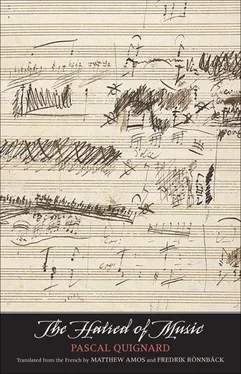Eochaid once had four sons. When he was old, his four sons joined forces against him. They fought him at a place known as Druim Criach. Initially, Eochaid tried to reach a truce with his sons. But only the youngest accepted and left Druim Criach, unwilling to fight against his brothers. The three others rejected the agreement. Eochaid promptly cursed his three sons, saying:
“Let them be like their name!”
Eochaid then did battle and killed seven thousand warriors, despite having only, for his part, three thousand men at his command. His three sons fell in the battle. Afterward, all three having been decapitated, their three heads were brought to Druim Criach before the end of the day. Eochaid looked at them and did not speak until night fell and buried all four of them — the three children and their father — in darkness. Whence the nickname Feidleach, which means fedil uch , long sigh, since after his sons had been killed in the battle of Druim Criach, sorrow never left his heart.
Not a single warrior doubted the suffering the king felt before the heads displayed before his eyes.
They all admired him, for the king had not dismissed his pain.
Since he had not emitted the slightest moan, he was nicknamed Long Sigh.

Saying is losing.
He wished to keep his children in his heart.
Nocturnal cave, animal maw, human mouth are all the same.
Room of paintings, mask-room, initiation room, cannibal room, forbidden room, secret room are all the same.

Until his death, even at the instant of his death, the suffering that Eochaid had endured in the twilight that followed the battle of Druim Criach, when night began to settle on the severed heads of his three sons, never crossed his lips.

Long sigh because he held it until he was among the dead, where he joined them.

Long sigh overflowing the lips, immense sigh pouring out, endless sob that holds nothing back, that unleashes all suffering to the point of hailing it and loving it, this is how, as king Eochaid’s antonym, the totality of European music of the nineteenth century presents itself. I label European Romantic music everything that was written from 1789 to 1914. This music has become completely inaudible, sentimental, outrageous, by now global, electrically multiplied, essentially bellicose. Tears of nostalgia for the land of their fathers fall from Frédéric Chopin’s eyes, from Richard Wagner’s, from Giuseppe Verdi’s. What did Romantic Europe invent? Horrendous war. Nationalism was the Romantics’ great claim and they perceived it as a right to a war that they considered feidil , which is to say just.
The legend that comes from the book of ancient Irish kings says that feidleach does not mean just, but fedil uch , long sigh.
Suddenly, war was defined by the Romantics as a liberation.

Meister Eckhart comments on Saint Augustine.
Saint Augustine wrote, at the end of the fourth century, twelve years before Rome was invaded, in book IV of the Confessions , recalling his years teaching rhetoric in Carthage: “My soul, be deaf in the ear belonging to your heart.”
Eckhart the Thuringian wonders ten centuries later: “How does one become deaf in aure cordis (in the ear of the heart)?” He adds: “I sow thorns and brambles.”
Then Eckhart writes: “I recommend abandoning everything that sounds. Isaiah said: ‘The voice cries out in the wilderness.’ Have you found in yourself the mark of the wilderness?”
Eckhart comments: “Therefore, in order for the voice to be heard and to cry out in the ear of your heart, make yourself, in your heart, the wilderness where it cries. Become wilderness. Listen to the wilderness of sound.”
This is the first argument Eckhart puts forth.

Eckhart suggests a second argument: “Hearing implies time. If hearing implies time, then hearing God is hearing nothing.
“Hear nothing.
“Free yourself from music.”

Eckhart suggests a third argument: “There are people who go out to sea with a weak wind and cross the sea: they do this but they do not cross it.
“The sea is not a surface. It is, from top to bottom, an abyss.
“If you want to cross the sea, sink.”
Ninth Treatise. TO DISENCHANT
The abode of noises and of sounds delimits in space a thin circular celestial layer whose thickness is less than one hundredth of the earth’s radius. This coat consists of 1. the surface of the exposed landmasses, 2. a fraction of the depth of the seas, 3. the aerial region that borders these two elements.
The ensemble of sounds and noises of winds, volcanoes, oceans, and life that has appeared over the lands that rose out of the waters is of such a diversity that it has compelled all the listeners of the world to resort to specific songs.
The abode of animal voices in the world is small.
The abode of human languages in the world is minuscule.

In the European world until 1914, the cock announced daybreak, the dog strangers, the horn hunting, the church carillon marked the hours, the bugle the stagecoach, the knell death, hullabaloo the remarriage of widows, flutes and drums the sacrifice of a carnival effigy. The rare violins of itinerant musicians were a sign of the annual feast and surrounded the game booths dating back to prehistory.
In order to listen to written music, one would have to wait until Sunday, at the High Mass, when organ pipes began to blow the chords that would bounce along the nave.
The listener’s back would suddenly shiver.
What used to be rare has become more than frequent. What used to be the most extraordinary has become a siege, ceaselessly assailing the city as well as the countryside. Humans have become assailed by music, besieged by music. Tonal and orchestral music has become the social tonos more than vernacular languages.
This is why, in the wake of the total war of the German Third Reich and as a consequence of the technology of reproduction of the melos , loving or hating music refers for the first time to the actual, original violence that is the foundation of acoustic control.

Fascism is related to the loudspeaker. It grew thanks to “radio-phony.” Then it was relayed by “tele-vision.”
In the course of the twentieth century, a historical, fascist, industrial, electric logic — whatever epithet one chooses to apply — took hold of the menacing sounds. Music, through the increase not of its practice (its practice, on the contrary, has become infrequent) but of its reproduction and its audience, from then on crossed the limit that separated it from noise. In the city, the diffusion of melodies produced phobic reactions, degenerating in a heroic fashion in the form of murders by rifle.
In the countryside, the rarity of assaults (airplanes, tractors, power saws, rifle shots, all-terrain motorcycles, all-wall drills and electric screwdrivers, lawn mowers, garbage dumpsters, television sets and record players more than a kilometer away, carried in surges by the wind) sometimes allows music to be recomposed little by little as a nonnoise.
Читать дальше













